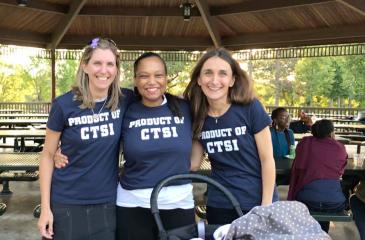Coaching has proven to be a powerful — if unexpected — force for advancing translational science.
It’s certainly helped catalyze the success of the early-career researchers at the University of Minnesota. Ever since CTSI began coaching its scholars in 2015, those scholars have gone on to secure major NIH awards, receive promotions, and conduct cutting-edge research that’s making a meaningful impact on people’s lives.
And, less predictably, coaching has unearthed insights on how institutions can better support their faculty researchers, including those at risk of leaving the field altogether.
Supporting researcher-moms
One key insight stemmed from a fateful coffee meeting. Michelle Lamere, MPA, ACC, a certified coach and the assistant director of CTSI’s education and training programs, had received a request to meet with a faculty researcher.
“I felt like I was failing both at work and at home,” recalls Manda Keller-Ross, PhD, DPT, PT, an assistant professor in the Division of Physical Therapy.
This was a familiar refrain to Lamere, having coached several University researchers who were also struggling to juggle the demands of academic research and motherhood. After their conversation, Lamere connected the researcher-moms via email and encouraged them to get together. And they did.
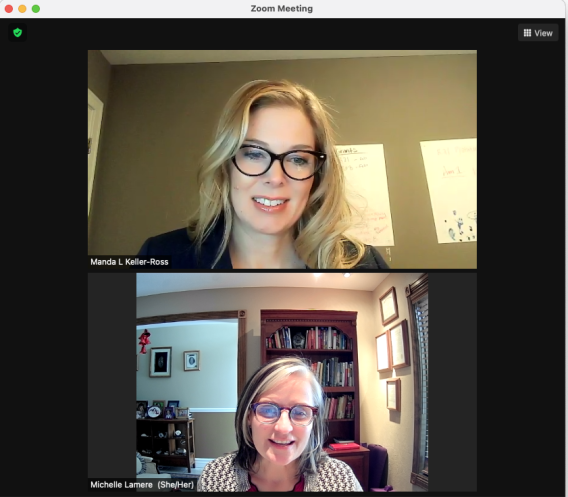
“We found an incredible support network in one another, but we knew we needed to go beyond commiserating,” recalls Allyson Hart, MD, MS, a former K-R01 Scholar and an Associate Professor of Medicine at Hennepin Healthcare in the Division of Nephrology.
They asked Lamere to join them to provide her expertise and give structure to their meetings. “Through trial and error, we began incorporating trainings and tools for taking control of our situation,” Dr. Hart explained.
Informal get-togethers blossomed into Mothers Leading Science, a full-fledged CTSI career development program that Drs. Keller-Ross and Hart co-created alongside other faculty and Lamere. Today, women in the program receive coaching, mentor one another, and attend an annual retreat that uses the Brené Brown Dare to Lead™ curriculum.
Empowering faculty leaders
The women who co-created Mothers Leading Science had first-hand experience with coaching’s transformative effects and knew they wanted to make it a key part of the program.
“Coaching makes me feel like I can do this for the long-term,” says Dr. Hart, reflecting on life as a researcher-mom. “I don’t want to get to the point of quitting because it’s too much.”
At CTSI, coaching begins with a Hogan assessment, widely considered to be the gold standard for professional coaching. Assessments measure factors like leadership strengths, challenges, and values and help scholars determine what kind of environment they want to create and what could derail them along the way.
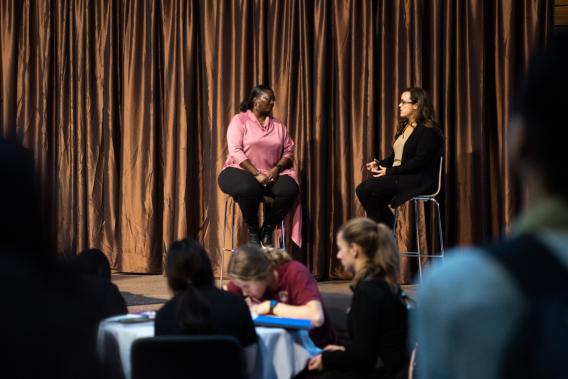
Developing skills
After the initial assessment, scholars meet with CTSI’s coach to discuss the results and then can schedule up to a dozen 1:1 coaching sessions. Popular self-selected topics covered during the sessions include self-empowerment, leadership development, work-life balance, managing lab personnel, handling negotiations, and navigating conflict.
These skills are helping researchers work through obstacles, explains Dr. Hart:
“I used to feel like my career was an external factor beyond my control. But now that I’ve had coaching, if something isn’t working, I focus on what I can do about it, whether that’s pivoting, working on a relationship, or something else. I’ve taken more control over what happens in my career.”
Charting personalized paths
Coaching sessions also help scholars lean into work that aligns with their values, separate from external pressures.
“I got a clearer sense of who I am and how I wanted to show up in my career,” explains Kate Diaz Vickery, MD, MSc, a former KL2 scholar, assistant professor with the UMN Medical School, and clinician-investigator with Hennepin Healthcare, a UMN CTSA hub partner. “Coaching makes me feel empowered; it was the best part of the KL2 program.”
Dr. Diaz Vickery’s confidence shone through last fall, when she participated alongside community members in a theater workshop and performance with zAmya Theater that shares her research on living with type 2 diabetes while homeless. She’s since joined Mothers Leading Science as part of its third cohort.
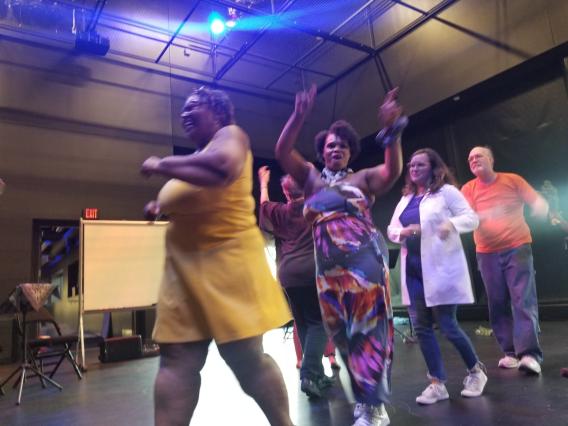
Retaining talent
For researcher-moms in particular, coaching is giving them the skills and mindset to navigate and define the “researcher” part of their identity.
“I had thoughts of leaving academia altogether, but coaching helped save me from quitting,” says Dr. Keller-Ross. “I discovered what boundaries I needed to feel successful both in my career and as a mom.”
Dr. Diaz Vickery expressed a similar sentiment, saying she might not have lasted through the pandemic had coaching not helped give her the clarity and encouragement to take control of her work.
Considering the enormous costs of faculty turnover, retention is key. Society loses when researchers stop what they’re doing, and it’s a financial loss for institutions as well. According to a 2012 report in Science, start-up costs for a faculty member in science or engineering can reach upwards of $1.5 million.
“Coaching helps us to tackle the problem of researcher retention head-on,” explains Lamere. “We get a deep understanding of what researchers need to flourish and use these insights to better support them.”
According to Lamere, coaching and programs like Mothers Leading Science are helping the University better retain its rising stars in research. And she thinks other institutions could adopt similar approaches to confront their own retention challenges.
“We all win when researchers stay in the workforce, especially those from diverse backgrounds that haven’t traditionally felt supported in academia,” says Lamere.
Advancing careers
University researchers who receive coaching aren’t just surviving; they’re thriving. And they’re becoming leaders and changing the system to help others to thrive.
Since she started receiving coaching, Dr. Keller-Ross has secured an independently funded K award, among other grants. She’s also boosted her publication productivity, thanks to the writing habits she developed during 1:1 sessions with Lamere:
“I went from averaging one or two publications a year, up to four. My focus is better.”
Dr. Diaz Vickery credits coaching with giving her the confidence to co-create the Health, Homelessness, and Criminal Justice (HHCJ) Lab. She also says that having a better sense of who she is and what she wants to focus on led directly to funding opportunities.
As for Dr. Hart, since her first coaching session, she’s become the IRB Chair for the Hennepin Health Research Institute, a senior staff member of the Scientific Registry of Transplant Recipients, and the co-director of the Office of Equity and Social Justice in the Hennepin Healthcare Department of Medicine.
“If I hadn’t received coaching, I don’t think I would have pursued the leadership positions I hold now,” says Hart. “Coaching supported me through pivotal moments of my career, while showing me I had the resilience and ability to take on additional roles.”
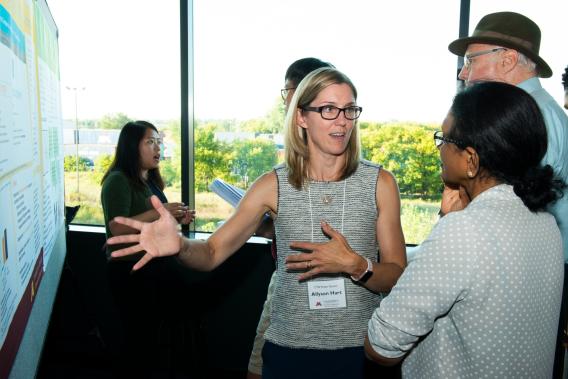
Expanding impact
Dr. Hart is also exploring approaches to help other women in the same boat. Noticing a parallel with the work of her colleague — renowned physician burnout researcher Dr. Mark Linzer — she’s exploring research collaborations and potential tools for better supporting researcher-moms.
Meanwhile, CTSI is broadening its reach and impact. It’s coached more than 75 scholars over six years and is now building upon this through group coaching. Most who attend the optional group coaching sessions are early-career BIPOC faculty, another valuable insight for health research institutions.
“We started coaching scholars because I believed it would help them individually with self-awareness to develop their careers with a greater sense of intentionality and wholeness,” says Lamere. “But I never imagined these coaching sessions would give us insights on addressing common challenges in translational science."
This research was supported by the National Institutes of Health’s National Center for Advancing Translational Sciences, grants UL1TR002494 and KL2TR002492. The content is solely the responsibility of the authors and does not necessarily represent the official views of the National Institutes of Health’s National Center for Advancing Translational Sciences.
